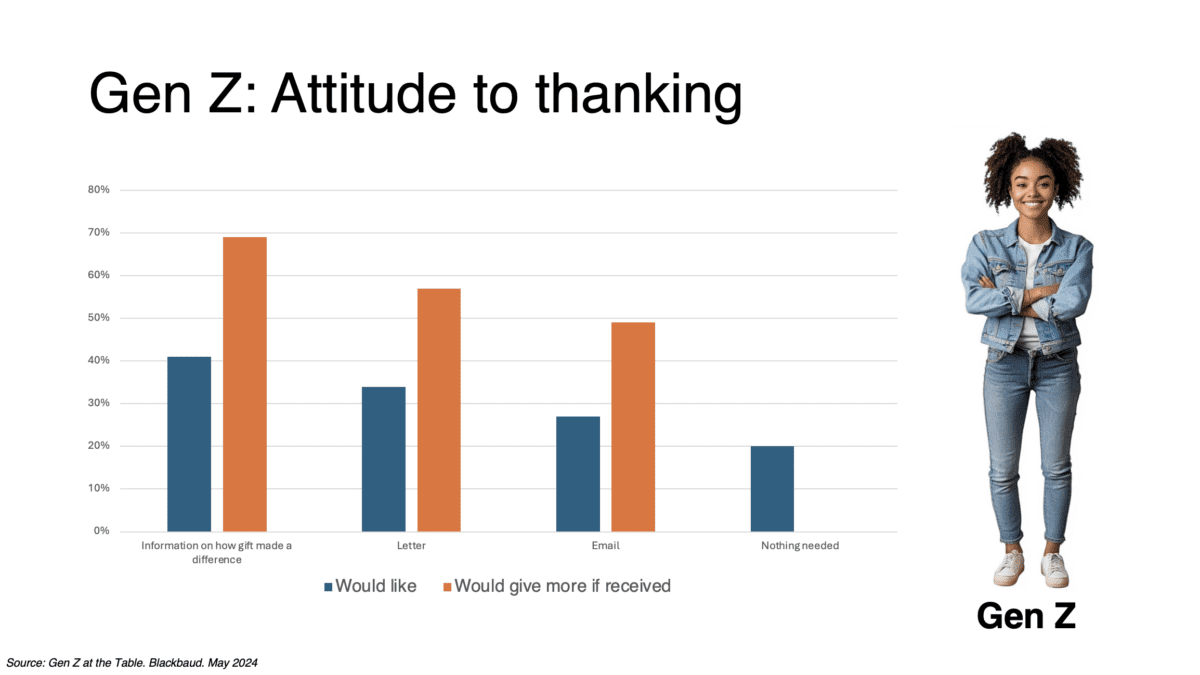Do younger donors like direct mail? And do they care about being thanked?
One of the things that’s seems to have entered the fundraising psyche over the last year or so, is the thought that younger people are a completely different philanthropic creature to their parents and grandparents.
Most importantly, there is a sense that they are going to have a different approach to giving that will stay with them for the rest of their lives that fundraisers are going to have to adapt to, to stay successful.
Often, this is presented as a need to move from relational practices to simple transactional fundraising techniques.
This isn’t the first time we have heard this type of claim. I remember that during the early 2000s a research paper suggested that Boomers were going to be very different fundraising prospects than the Silent Generation. Almost Twenty five years later, we know that those young Boomers morphed into having very similar attitudes to giving as the older generations as time marched on.
At Bluefrog, we speak to hundreds of donors each year in our qualitative research studies, and we have found that when it comes to people who actually give, there isn’t a huge amount of difference between younger and older donors. We often find that some younger non-donors can cite reasons why they don’t give that shifts the blame to charities. For example, we might hear them complain about charities not asking in the right way, making giving too difficult or even not fun enough.
But when you speak to younger people who do give, these complaints fade away and are replaced with very similar concerns to those of older donors. You’ll see at the top of the page, a chart from a Bluefrog insight presentation into who gives, that illustrates what we see in our qualitative studies with some findings from Blackbaud’s report into the next generation of giving, Gen Z at the Table.
One of the areas it highlights is how Gen Z views thanking. And like older generations, a significant number want to know how their gifts are used. Most importantly, more than two-thirds of Gen Zs say this would encourage them to give more.
And when it comes to preferred media, it's letters – yep, through the post – that are their favourite way to be thanked, with well over half the respondents saying letters would get them thinking about giving more.
Interestingly about 20% of Gen Zs say thanking isn’t necessary. We often find in our qualitative discussions that a significant number of older donors will also say that thanking isn’t important to them, but when we discuss in more detail, they soon start contradicting themselves as they explain how great thanking has helped create the strongest relationships they have with charities.
It's more evidence to show that human nature doesn't change that much and if you want to engage younger and older donors, great thanking and great impact reporting should be central to your plans.
Tags In
The Essentials

Crack the Code to Regular Giving: Insights, Strategies, and a Special Giveaway!

‘Tis Halloween. Keep to the light and beware the Four Fundraisers of the Apocalypse!

Why do people give? The Donor Participation Project with Louis Diez.

A guide to fundraising on the back of a postcard

What does the latest research tell us about the state of fundraising?






